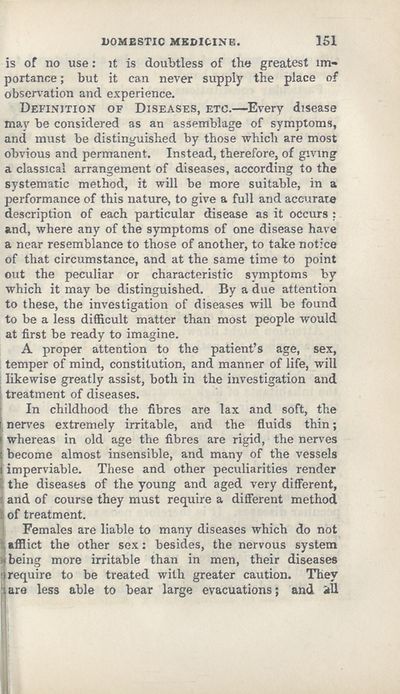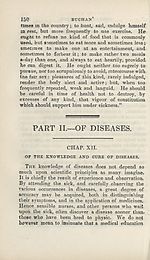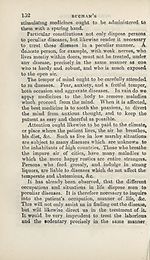Diseases > Domestic medicine
(185)
Download files
Complete book:
Individual page:
Thumbnail gallery: Grid view | List view

DOMESTIC MEDICINE. 151
is of no use: it is doubtless of the greatest im¬
portance ; but it can never supply the place of
observation and experience.
Definition of Diseases, etc.—Every disease
may be considered as an assemblage of symptoms,
and must be distinguished by those which are most
obvious and permanent. Instead, therefore, of giving
a classical arrangement of diseases, according to the
systematic method, it will be more suitable, in a
performance of this nature, to give a full and accurate
description of each particular disease as it occurs:
and, where any of the symptoms of one disease have
a near resemblance to those of another, to take notice
of that circumstance, and at the same time to point
out the peculiar or characteristic symptoms by
which it may be distinguished. By a due attention
to these, the investigation of diseases will be found
to be a less difficult matter than most people would
at first be ready to imagine.
A proper attention to the patient’s age, sex,
temper of mind, constitution, and manner of life, will
likewise greatly assist, both in the investigation and
treatment of diseases.
In childhood the fibres are lax and soft, the
nerves extremely irritable, and the fluids thin;
whereas in old age the fibres are rigid, the nerves
become almost insensible, and many of the vessels
imperviable. These and other peculiarities render
the diseases of the young and aged very different,
and of course they must require a different method
of treatment.
Females are liable to many diseases which do not
afflict the other sex: besides, the nervous system
being more irritable than in men, their diseases
require to be treated with greater caution. They
are less able to bear large evacuations; and all
is of no use: it is doubtless of the greatest im¬
portance ; but it can never supply the place of
observation and experience.
Definition of Diseases, etc.—Every disease
may be considered as an assemblage of symptoms,
and must be distinguished by those which are most
obvious and permanent. Instead, therefore, of giving
a classical arrangement of diseases, according to the
systematic method, it will be more suitable, in a
performance of this nature, to give a full and accurate
description of each particular disease as it occurs:
and, where any of the symptoms of one disease have
a near resemblance to those of another, to take notice
of that circumstance, and at the same time to point
out the peculiar or characteristic symptoms by
which it may be distinguished. By a due attention
to these, the investigation of diseases will be found
to be a less difficult matter than most people would
at first be ready to imagine.
A proper attention to the patient’s age, sex,
temper of mind, constitution, and manner of life, will
likewise greatly assist, both in the investigation and
treatment of diseases.
In childhood the fibres are lax and soft, the
nerves extremely irritable, and the fluids thin;
whereas in old age the fibres are rigid, the nerves
become almost insensible, and many of the vessels
imperviable. These and other peculiarities render
the diseases of the young and aged very different,
and of course they must require a different method
of treatment.
Females are liable to many diseases which do not
afflict the other sex: besides, the nervous system
being more irritable than in men, their diseases
require to be treated with greater caution. They
are less able to bear large evacuations; and all
Set display mode to:
![]() Universal Viewer |
Universal Viewer | ![]() Mirador |
Large image | Transcription
Mirador |
Large image | Transcription
| Antiquarian books of Scotland > Diseases > Domestic medicine > (185) |
|---|
| Permanent URL | https://digital.nls.uk/119890362 |
|---|
| Description | Thousands of printed books from the Antiquarian Books of Scotland collection which dates from 1641 to the 1980s. The collection consists of 14,800 books which were published in Scotland or have a Scottish connection, e.g. through the author, printer or owner. Subjects covered include sport, education, diseases, adventure, occupations, Jacobites, politics and religion. Among the 29 languages represented are English, Gaelic, Italian, French, Russian and Swedish. |
|---|

